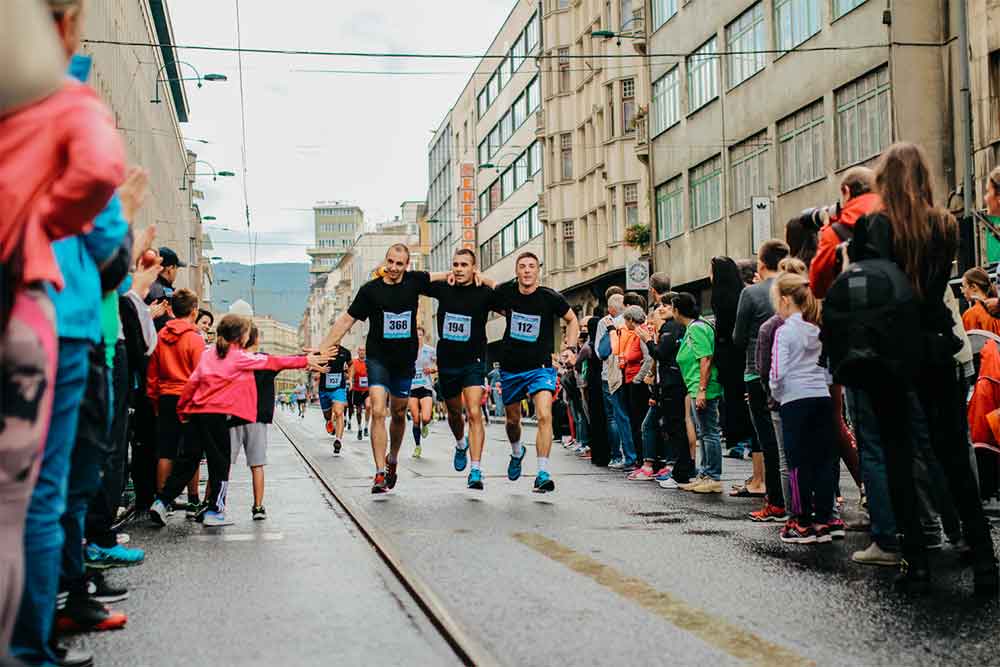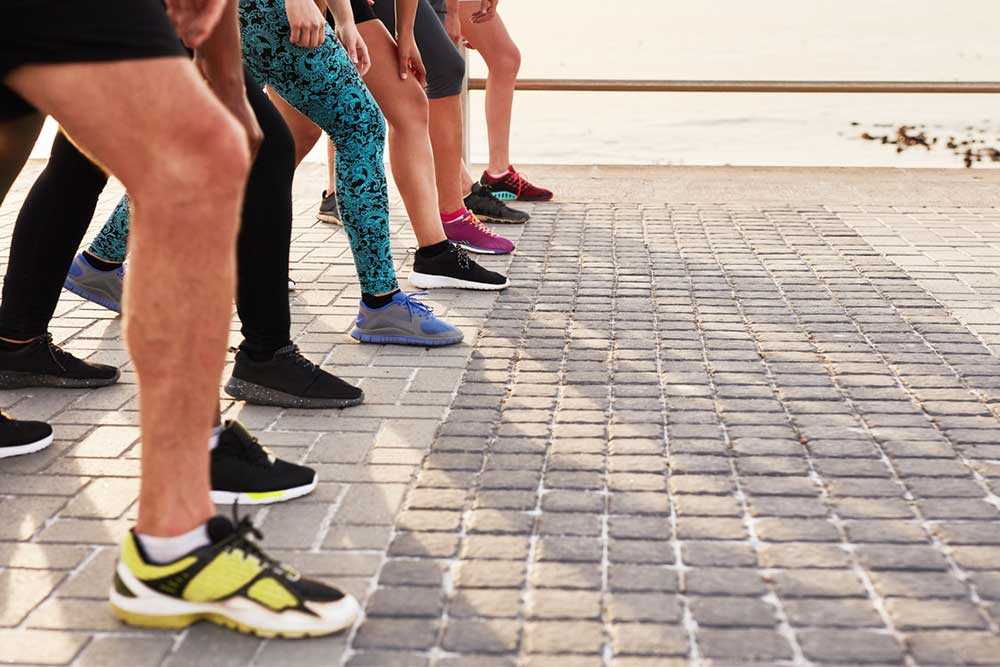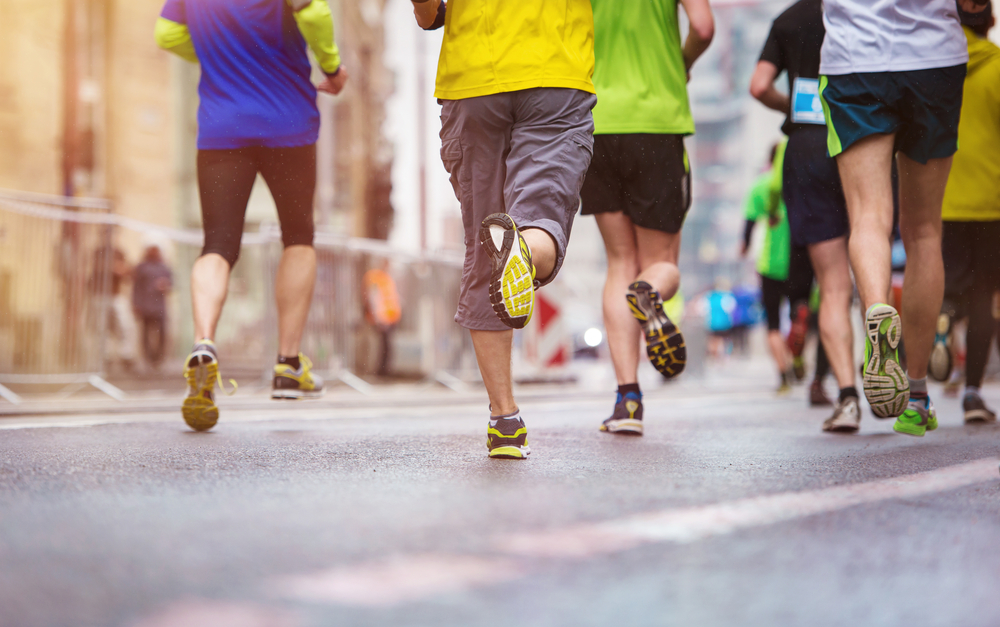If you have been around the health and fitness space over the last few years, then you would have heard about the ketogenic diet.
You know that diet that helps with weight loss, metabolic disease, and cognitive function?
Yeah, that one.
But does it also improve running?
What is the keto diet?
The ketogenic diet (or keto diet for short) is a way of eating that is high in fat, moderate in protein, and extremely low in carbohydrate (Westman, 2003).
Just to be clear, when I say low, I mean low.
As in, less than 50 grams per day.
To provide some perspective, a small apple contains around 20 grams of carbohydrates.
Now, you might be wondering why anyone would actually want to keep their carbohydrate intake to less than 50 grams per day – and it is because there are a number of benefits associated.
What are the benefits of the keto diet?
You know that your body can use both fats and carbohydrates to create energy.
But, when you run out of carbohydrates (like when you are following the keto diet, for example), then your body increases the rate it breaks down fats energy – which has been shown to have some powerful effects on the body, including (Krikorian, 2012; Paoli, 2013; Vargas, 2018):
- Enhanced cognitive function
- Increased rates of fat loss
- Reductions in blood sugar, blood cholesterol, and blood pressure levels
- Declines in inflammation
All of which contribute to some serious health outcomes!
Side effects of the keto diet
While there are several positives associated with the keto diet, there is also one keto side effect that need mentioning – and it is known as the keto flu.
The keto flu describes the withdrawal like symptoms that some people experience when they first exclude carbohydrates from their diet.
This essentially occurs when people make the transitions from using carbohydrates for energy, to using almost entirely fats. The keto flu can last about a week, and can come with feelings of lethargy, mental fuzziness, headaches, muscle cramping, and fatigue.
This will last until you become what is known as ‘keto-adapted’ – which describes the state where your body is used to functioning without carbs.
It is important to note that these symptoms can be lessened by drinking a lot of water and eating a lot of fats.
Is keto beneficial for runners?
We have touched on the benefits of the keto diet on health, but what about exercise performance?
During exercise, your body has the capacity to break down both fats and carbohydrates for energy – however, where this energy comes from is heavily dictated by the intensity of that exercise (Aslankeser, 2017).
Under normal dietary circumstances, during lower intensity exercise fats are your predominant fuel source. Then, as exercise intensity increases, carbohydrates start to take over.
To put it simply, this occurs because fats are a very effective source of fuel – but they are slow to break down. Whereas we get less energy from carbohydrates, but they can be broken down much faster.
And this should give you some insight into how the keto diet impacts runners (McSwiney, 2019).
The keto diet and long-distance running
People who follow the ketogenic diet become more efficient at breaking down fats for energy. At first glance, this may look like a good thing for endurance running – especially because fats are a more powerful form of energy.
However, research has shown that while fat is your primary source of fuel during this type of exercise, you also break down carbohydrates for energy.
And that this is important for exercise performance.
In fact, research has shown to those athletes on a keto diet may be less efficient when it comes to long distance endurance exercise because their ability to produce energy rapidly when they need too becomes impaired.
Related Article: Can Nitrate Rich Vegetables Boost Your Endurance?
The keto diet and intense exercise
Interestingly, sprinters and middle-distance runners appear to see no declines in performance when they decide to follow a ketogenic diet (in fact, some athletes even improve).
While the exact reason for this is not clear, it has been hypothesized that those athletes on a ketogenic diet become better at storing what little glycogen they have in their muscle tissue.
This then improves their ability to perform exercise of a high intensity and a short duration.
It is important to note that as they are not eating carbohydrates, once these stores are depleted, it is highly likely that their performance will drop off a cliff.
The keto diet and CrossFit
So, what about exercise that is long duration and high intensity.
Exercise like CrossFit for example?
Well, research has shown that CrossFit athletes who adopt a keto diet do not see any declines in performance compared to those who follow a traditional higher carbohydrate way of eating during blocks of training (Kephart, 2018).
However, during periods of intense competition, it is highly likely that increasing carbohydrate intake will improve exercise performance, as energy production occurs over a much longer duration.
Related Article: 3 Benefits of CrossFit
The keto diet, body composition, and runners
You might be wondering that if the ketogenic diet does not improve exercise performance, what is the point for runners – and there is one big benefit that we did not touch on.
Lots of individuals who follow the ketogenic diet tend to see a significant improvement in their body composition. This is typified by a reduction in fat mass, combined with the retention of lean muscle mass.
Now, this goes a lit further than just putting you in a healthier BMI category.
See, runners who have lower body fat percentages tend to have less ‘dead weight’ to carry around – making them more efficient.
As a result, the ketogenic diet may improve performance by reducing body fat.
Does a keto diet aid run recovery?
Interestingly, there is also some preliminary research suggesting that the ketogenic diet may help in recovery after exercise.
In conjunction with the health benefits mentioned above, the ketogenic diet has been shown to reduce inflammation throughout the body. This inflammation plays a role in inducing post exercise muscle damage, and delaying post exercise recovery.
Consequently, it is believed that those individuals on a ketogenic diet will recover faster after exercise (Ma, 2019).
Tips to get started on keto
With all this information, you might be wondering how to get started on keto? And here are my best tips:
- Eliminate carbohydrates from your diet: this means no fruits, starchy vegetables, pasta, cereal, lentils, beans, grains, breads, or junk food.
- Eat a lot of fat and protein: avocados, meat, eggs, and dairy are your best friends here.
- Eat leafy green vegetables: leafy green vegetables contain next to no carbohydrates and are full to the brim with vitamins and minerals.
- Drink heaps of water: drinking a lot of water has been shown to prevent the keto flu.
With these tips, there are a couple of other things I want to touch on.
Given that some of the best performance benefits associated with the ketogenic diet come with its ability to promote fat loss. As a result, combining it with intermittent fasting is an extremely useful strategy to maximise fat loss.
Additionally, as I mentioned above, while the ketogenic diet appears to have numerous health benefits, it can impair performance in certain scenarios.
As a result, it is in your best interest to slowly re-introduce carbohydrates into your diet in the lead-up to any competitions to maximise your exercise performance.
By following these tips, you can have the best of both worlds – getting all the benefits from going keto, without any of the potential negatives.
But what if I have high cholesterol?
Finally, I wanted to touch on group of people who might need to make some minor adjustments to the ketogenic diet to ensure their health is maintained.
And that is people with high cholesterol.
See, while the ketogenic can have a positive impact on numerous aspects of health, there is some evidence to suggest that it can actually lead to an increase in both total cholesterol and LDL cholesterol (which is considered the ‘bad’ cholesterol) (Kosinski, 2017).
This means that if you have already been diagnosed with dyslipidaemia or high cholesterol, a traditional ketogenic diet may not be your best bet.
However, that does not mean you cannot use it all – just that you need to make some considerations.
- Make sure most of your protein comes from sources that have minimal saturated fat: this means lean cuts of poultry and good quality seafood are your best bet here.
- Try and consume adequate fibre: this means fibrous veggies that are lower in carbohydrates like asparagus, spinach, broccoli, and peas are ideal.
- Limit your intake of dairy: while dairy is normally a key component if the keto diet, it is full to the brim with saturated fat.
- Use monounsaturated fats in your cooking: extra virgin olive oil is the best choice here.
And there you have it – some great tips for following the ketogenic diet if you have high cholesterol.
Related Article: Post Exercise Meal Impact On Triglyceride & Cholesterol Levels
Take Home Message
The ketogenic diet is a viable way of eating that helps athletes lose body fat and enhance long term performance potential. However, you must be careful with how it is implemented – so make sure you follow the tips listed in this article closely.
And if you have had any experience with the keto diet, we would love to hear about it – so make sure to drop us a comment below!
References
Westman, Eric C., et al. “A review of low-carbohydrate ketogenic diets.” Current atherosclerosis reports 5.6 (2003): 476-483.
Krikorian, Robert, et al. “Dietary ketosis enhances memory in mild cognitive impairment.” Neurobiology of aging 33.2 (2012): 425-e19.
Vargas, Salvador, et al. “Efficacy of ketogenic diet on body composition during resistance training in trained men: a randomized controlled trial.” Journal of the International Society of Sports Nutrition 15.1 (2018): 31.
Paoli, Antonio, et al. “Beyond weight loss: a review of the therapeutic uses of very-low-carbohydrate (ketogenic) diets.” European journal of clinical nutrition 67.8 (2013): 789.
Aslankeser, Zübeyde, and Şükrü Serdar Balcı. “Re-examination of the contribution of substrates to energy expenditure during high-intensity intermittent exercise in endurance athletes.” PeerJ 5 (2017): e3769.
McSwiney, Fionn T., et al. “Impact Of Ketogenic Diet On Athletes: Current Insights.” Open Access Journal of Sports Medicine 10 (2019): 171.
Kephart, Wesley C., et al. “The three-month effects of a ketogenic diet on body composition, blood parameters, and performance metrics in crossfit trainees: a pilot study.” Sports 6.1 (2018): 1.
Ma, Sihui, and Katsuhiko Suzuki. “Keto-Adaptation and Endurance Exercise Capacity, Fatigue Recovery, and Exercise-Induced Muscle and Organ Damage Prevention: A Narrative Review.” Sports 7.2 (2019): 40.
Kosinski, Christophe, and François R. Jornayvaz. “Effects of ketogenic diets on cardiovascular risk factors: evidence from animal and human studies.” Nutrients 9.5 (2017): 517.
You Might Like:
Ketogenic Diet and Running: What You Need to Know
If you have been around the health and fitness space over the last few years,...Are Runners Less Likely to Develop COVID-19?
In this weird time of COVID-19, I have heard some strange suggestions regarding how you...5 Ways to Get Rid of Shin Splints
Ryan Cross, Physiotherapist Pain related to “shin splints” is one of the most common ailments...The Most Efficient Way to Run Faster
Evan Stevens, Sprint Coach Phosphocreatine is the most immediate source of energy we have access...Upper Body Workouts For Distance Runners
When we run long distances it is crucial to focus on form, function, and balance....Use the Hurdle Step to Test Your Running Mechanics
An easy way to test or observe your running mechanics is to use the Functional...Study May Predict Runner’s Half-Marathon Performance
A Review by Alyssa Bialowas Participating in marathons and half-marathons has become a very popular...It’s Not Too Late To Become A Runner
(adsbygoogle = window.adsbygoogle || []).push({}); Alyssa Bialowas Running has many benefits for your health, from...Running Cool Down Drills | FastTwitchGrandma Running Tips & Tricks
Post Workout Drills Post workout drills are an important tool to help improve performance. These...Core Workout For Runners | FastTwitchGrandma Sprinting Tips & Tricks
In the next sprinting video presented by Forever Fit Science – imagine a car with...Do You Need A Pacer?
Alyssa Bialowas Introduction Strong displays in endurance sport are as much about pacing as training....The Case for CEE – Intervals Vs Endurance (Part 4)
Evan Stevens CEE has been getting a bad rap lately thanks to HIIT. Passé and...Does Movement Therapy Prevent Running Injuries?
A Review by Alyssa Bialowas Runners have an increased risk of injury that results from...Meet a Track & Field Masters Athlete
Recently, Forever Fit Science attended the Huntsman Senior Games, where we stopped to talk with...What Factors Determine Ultra-Marathon Success?
Julia C. Basso, PhD 100 miles is approximately the distance from the surface of the...The Science Behind Good Running Music
Catherine O’Brien What makes a good running song? A couple weeks ago I discussed research...95 Year Old Track Star
Mary Kemp, age 95 battles it out on the track field during the 100m dash....These 92 Year Olds Will Change Your Life
Meet Sid and Dotty. We caught up with these two competitors at the 2017 Huntsman...Masters Track & Field Inspiration
These Masters Track & Field athletes prove age is just a number. Recently Forever Fit...Running Does Not Cause Arthritis
Ryan Cross, B.A. Hons (Kin), MScPT, FCAMPT Registered Physiotherapist in Sarnia, Ontario, Canada Physical changes...The Crucial System Responsible For Runner’s High
Catherine O’Brien A runner’s high is a state or feeling that is reached after a...Become A Runner at Any Age
Gillian White BSc, MSc, PhD Candidate University of Toronto Exercise Sciences Why society is telling...A New Form Of Aerobic Training: Micropause
Dayton Kelly This article was adapted from a combination of speeches given at the European...A Look Inside The Mind Of Distance Runners
Catherine O’Brien Have you ever driven past a runner and thought “I wonder what is...Run/Walk Or Run Only?
Catherine O’Brien When I first started running, my mom introduced me to the Galloway Method....Improve Pace By Running With Others
Catherine O’Brien I enjoy running alone and am intimidated at the idea of running with...Meet Master Marathoner Kenneth Mungara
Kenneth Mungara, 43, is the Master’s Marathon World Record holder. He is also the winner...5 Bio-Motor Abilities
Forever Fit Science’s founder Virginia Davies explains the 5 bio-motor abilities crucial to a well-rounded...Who Takes the Cake at Pacing During the Marathon?
Evan Stevens The other talk in the session that did not tread on familiar ground...Meet Masters Runner Nick Berra
Meet Forever Fit Science masters runner Nick Berra. Berra is a 2-time USATF Masters Athlete...Trigger Motion: Running Terms For Those New to the Game
Evan Stevens Trigger Motion: Running Terms For Those New to the Game Heading to the...BJ McHugh, age 85 ran the Honolulu Marathon
Grayson Fertig The Great Gift of Gullibility I like the stories that begin Once Upon...Those Who Run Together, Stay Together
Sara Thompson, MSc in Exercise Science Most of us can relate to the main barriers...The post Ketogenic Diet and Running: What You Need to Know appeared first on ForeverFitScience.
























No comments:
Post a Comment